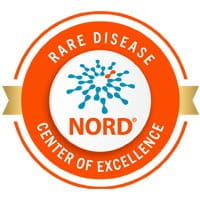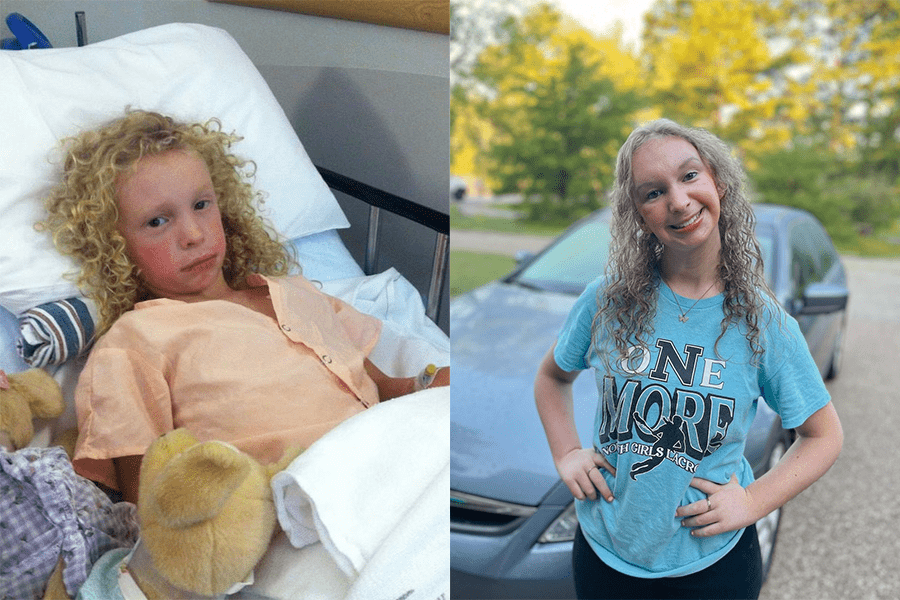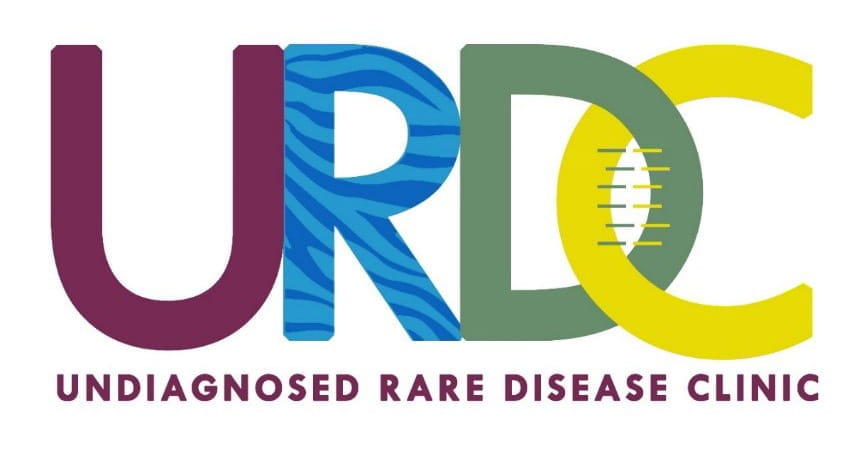Undiagnosed Rare Disease Clinic
The Undiagnosed Rare Disease Clinic, directed by Erin Conboy, MD and Francesco Vetrini, PhD, is a clinical research program launched in January 2020 at IU School of Medicine. The Undiagnosed Rare Disease Clinic is aimed at finding the genetic underlying cause of rare disease and in doing so provide answers in the form of a genetic diagnosis to patients and their families who are struggling with the uncertainty of an undiagnosed rare disease. This program is focused mainly on pediatrics, but patients may be any age, from newborns to those with adult-onset disorders. Patients have likely been seen by multiple providers and had extensive testing done, but still have not received conclusive results about their condition. Specific expected symptoms include multiple congenital anomalies, abnormalities (that you can see on physical exam or as internal organ malformations), patients with severe developmental delays, severe autism, severe seizures or Mendelian disorders (involving one specific gene).
Support our work
Help support our goals to provide leading-edge genetic testing and research, expand program capacity to serve more families awaiting answers, and train the next generation of physician scientists in medical genetics.

What to expect in the evaluation
Patients meet with the medical geneticist and genetic counselor, who conduct a detailed review the patient’s health history, family history and previous genetic testing. If appropriate, the patient (and family members) is offered enrollment in the research part of the project. Once consented, samples (blood, urine and skin biopsy as needed) are obtained for research genome sequencing, research RNA sequencing and other clinical testing as needed. The genome data is then analyzed and interpreted by our team of genomic scientists. A multidisciplinary team discuses the findings of the analysis to ensure that a definitive genetic diagnosis can be established. If a diagnosis has been found, the team will complete a follow up visit with the patient (family) and will provide follow-up care recommendations to the referring provider as appropriate.
For questions about the Undiagnosed Rare Disease Clinic, please contact us at urdc@iu.edu.
Undiagnosed Diseases Network
The Undiagnosed Diseases Network is a national research study funded by the National Institutes of Health. Its purpose is to bring together clinical and research experts from a network across the United States to solve the most challenging medical mysteries. In 2023, IU School of Medicine became a clinical site for the Undiagnosed Diseases Network and as of September 2024 is open to receive patient applications from around the Midwest. This program runs in parallel with the Undiagnosed Rare Disease Clinic with some differences. The Undiagnosed Diseases Network accepts applications from both adults and children. Interested patients and families can apply online.
If you have any questions or are unsure about the Undiagnosed Diseases Network and/or the application process, please contact us at udn@iu.edu.
Join the Genome Board
The Genome Board is a forum for a multidisciplinary team of providers, laboratorians, researchers and students to review and discuss patient cases. The team has a detailed discussion of variants, genomic, transcriptomic and metabolic information to help determine if an underlying cause of the patient’s symptoms can be found.
Genome Board is held the last Friday of the month at 12 p.m. Please contact Lili Mantcheva to be added to the Genome Board invitation list.
Video
Learn about the Undiagnosed Rare Disease Clinic from director Erin Conboy, MD.
In the News

Genetic detectives unlock 16-year mystery
IU’s Undiagnosed Rare Disease Clinic gains national distinction for expertise in diagnosing unknown genetic disorders as part of international investigative network.

Undiagnosed Rare Disease Clinic uses tech and teamwork to solve medical mysteries
Established in January 2020 through a grant from IU’s Precision Health Initiative, the Undiagnosed Rare Disease Clinic uses team science to sleuth out medical mysteries stemming from genetic code errors.
Undiagnosed Rare Disease Clinic Team

Erin Conboy, MD
Director, Undiagnosed Rare Disease Clinic
Assistant Professor of Clinical Medical and Molecular Genetics
Erin Conboy studied biology at Grinnell College in Iowa, then medical school in Hersey, Pennsylvania and finally finished her training at Mayo Clinic in Rochester, Minnesota. She is a clinical and metabolic genetics physician and pediatrician with a special interest in the diagnosis of rare disease. She is the director of the Undiagnosed Rare Disease Clinic at IU School of Medicine and IU Health. She has two sons and enjoys practicing Brazilian Jiu-jitsu with her family.

Francesco Vetrini, PhD
Assistant Professor in Medical and Molecular Genetics
Associate Director of the CLIA-NGS laboratory
Co-Director of Clinical Genomic Services, Undiagnosed Rare Disease Clinic
Co-Director of the MMGE Covid-19 Testing Laboratory
Dr. Francesco Vetrini, PhD, received his doctorate in Medical Genetics from the Second University of Naples in Italy and then went on to complete a postdoctoral fellowship at Baylor College of Medicine in Houston, TX.
Vetrini spent more than four years as the Lead Clinical Genomics Scientist at Baylor Genetics before joining IU School of Medicine in 2018 as an ABMGG fellow in the Department of Medical and Molecular Genetics.
As a genomics scientist with expertise in rare disease and new gene discovery, he was recruited to help Dr. Conboy launch the Undiagnosed Rare Disease Clinic.
His primary responsibilities as the clinic's co-director include the development of protocols for genomic assessment of patients by integrating genomics, transcriptomics, and proteomics, the formation of collaborations for functional studies of candidate genes and variants and co-leading the medical genetics genome board with Dr. Conboy.
Vetrini leads the genomic variant analysis and interpretation, which is completed by a multidisciplinary team that discusses the final interpretation before making recommendations in a final report.
Vetrini's overarching goal is to end the diagnostic odyssey of patients and families by utilizing an integrated multi-omics approach that will improve our understanding of the molecular basis of genetic disorders, resulting in better patient care and conclusive answers for families.

Lili Mantcheva, MPH, CCRP
Program Manager
Lili Mantcheva earned her MPH degree in Social and Behavioral Sciences from the Richard M. Fairbanks School of Public Health Indianapolis and her undergraduate degrees in Chemistry and German from Butler University. Lili has previous experience in various healthcare and public health settings, more specifically as a clinical research coordinator at the Indiana University Neuroscience Center, focused on Alzheimer’s disease research and most recently as a health programs director for a local non-profit organization in Indianapolis. Currently, as the Project Manager for the Undiagnosed Rare Disease Clinic, she is responsible for the day-to-day operational organization, overall framework and protocol development, and patient consenting and coordinating during clinic visits. In her free time, she likes to travel, play tennis, walk/hike outdoors, read, and spend time with her family and friends.

Kayla Treat, CGC
Genetic Counselor
Kayla Treat is a pediatric genetic counselor with IU Health and IU School of Medicine. She enjoys seeing a wide variety of clinical indications in the general genetics clinics. She graduated from the IU Genetic Counseling Graduate Program in 2013 and initially accepted a pediatric genetic counseling position at Washington University School of Medicine in St. Louis where she worked in several multidisciplinary clinics at St. Louis Children’s Hospital. She moved back to Indianapolis in October 2014 to accept her current position, and she has loved seeing the growth of the department over the past several years. In 2019 she accepted a new role within the department as the genetic counselor with the Undiagnosed and Rare Disease Clinic. This role felt like a natural fit given her interest in complex genetic syndromes, and she looks forward to seeing the expansion of the clinic over time. She also enjoys working as a clinical supervisor for the IU Genetic Counseling program and recently transitioned to a role as co-course instructor for the medical genetics clinical rotations.

Khurram Liaqat, PhD
Postdoctoral Clinical Genomic Scientist
Khurram Liaqat, PhD, is a postdoctoral clinical genomic scientist at the Undiagnosed Rare Disease Clinic. Dr. Liaqat’s primary research interests include rare genetic disorders.
Dr. Liaqat earned his PhD in Biotechnology (Human Molecular Genetics) and MS in Molecular Biology at Quaid-i-Azam University, Pakistan. During PhD, he spent about two years as a predoctoral fellow at Dr. Suzanne M. Leal’s lab at the Department of Molecular and Human Genetics, Baylor College of Medicine in Houston, TX. He has also completed two years of postdoctoral fellowship at Dr. Leal’s lab at the Center for Statistical Genetics, Department of Neurology, Columbia University Irving Medical Center, New York. During his tenure at Dr. Leal’s lab, he focused on the genetic basis of various rare diseases including skin, bone, neurological and hearing abnormalities.
In May 2023, Dr. Liaqat accepted a new role within the Department of Medical and Molecular Genetics as a postdoctoral clinical genomic scientist with the Undiagnosed Rare Disease Clinic. His primary responsibilities include the interpretation of genetic sequence variation identified through diagnostic genetics testing or through the research pipelines, primarily using Next Generation Sequencing (WES, WGS, and RNA-seq) under the supervision of clinic directors Dr. Vetrini and Dr. Conboy. Dr. Liaqat is also involved in research projects that report novel gene discoveries, and variant reclassification and contribute to scientific publications.
He is also a recipient of the International Research Support Initiative Program (IRSIP) award from the Higher Education Commission (HEC) of Pakistan. In his free time, he enjoys traveling and spending time with his family in outdoor activities.

Tae-Hwi L. Schwantes-An, PhD
Assistant Professor of Medical & Molecular Genetics
Dr. Schwantes-An is a genetic epidemiologist whose work focuses on understanding and identifying genetic underpinnings of complex human diseases. He received his PhD from Washington University in St. Louis and completed his postdoctoral training at the National Human Genome Research Institute at National Institutes of Health. He serves as a co-leader of bioinformatics team for Undiagnosed and Rare Disease Clinic. He is an assistant research professor in the Department of Medical and Molecular Genetics and in the Division of Cardiology in the Department of Medicine.

Marco Abreu
Bioinformatician
Marco Abreu studied biochemistry and chemical biotechnology at East Stroudsburg University in Pennsylvania, then studied bioinformatics at Virginia Commonwealth University in Virginia. He is currently a bioinformatician for the Department Medical and Molecular Genetics Department at IU School of Medicine. He enjoys serving his dog and cat overlords.
Undiagnosed Diseases Network Team

Stephanie Ware, MD, PhD
Chair, Department of Medical & Molecular Genetics
Dr. Ware is the Joe C. Christian Chair and Professor of the Department of Medical and Molecular Genetics and Professor of Pediatrics. She is the director of the Cardiovascular Genetics, Herman B Wells Center for Pediatric Research, Indiana University School of Medicine. She received her BS from Butler University, Indianapolis, IN. She earned her MD and PhD degrees at the University of Cincinnati College of Medicine, where she was elected to the Alpha Omega Alpha Honor Society. Dr. Ware completed her pediatric residency and clinical genetics fellowship at Baylor College of Medicine. Dr. Ware directs the IU Health–IU School of Medicine participation in the NORD Rare Disease Centers of Excellence Network, co-directed the genomic medicine pillar for the Precision Health Initiative, and leads the Diagnostic Center of Excellence site of the NIH Undiagnosed Diseases Network. She is a charter member of the IU Health-IU School of Medicine genomic medicine council and is an elected member of the American Society for Clinical Investigation.
Dr. Ware’s research interests include the genetic and developmental basis of disorders of cardiac structure and function. Her NIH-funded research laboratory has made significant contributions in the areas of congenital heart defects and cardiomyopathy using animal models and performing patient-oriented research. She has published over 150 peer-reviewed articles and authored or co-authored 23 book chapters and over 250 abstracts.

Brett H. Graham, MD, PhD
Professor of Medical & Molecular Genetics
Dr. Graham obtained his MD and PhD from Emory University and then moved to Baylor College of Medicine and Texas Children’s Hospital for clinical residency training in pediatrics and clinical fellowship training in medical genetics. After a postdoctoral research fellowship, he joined the faculty of the Department of Molecular and Human Genetics at Baylor and rose through the ranks to associate professor, where he was an active member of BCM’s NIH Undiagnosed Disease Network team. He moved to Indianapolis in 2017 to join the Department of Medical and Molecular Genetics as an associate professor and associate director of clinical genetics. Dr. Graham’s research laboratory is focused on studying mitochondrial biology and disease using models in both mouse and fruit fly. In his clinic, Dr. Graham evaluates and manages patients with medical genetic problems and inborn errors of metabolism.

Lili Mantcheva, MPH, CCRP
Program Manager

Kayla Treat, CGC
Genetic Counselor

Marco Abreu
Bioinformatician
